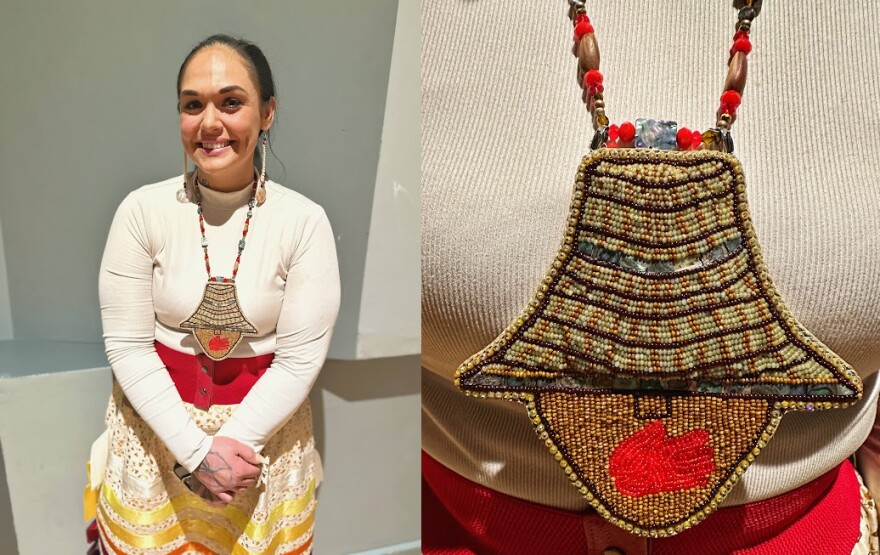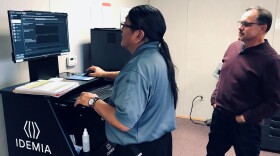Human trafficking awareness and prevention was the focus of a community discussion last Thursday at Eugene’s Hult Center. Among those attending were advocates for Missing and Murdered Indigenous People.
More than 150 people attended the sold out event, organized by the Junior League of Eugene. Among them was Amanda Freeman, a member of the Confederated Tribes of Grand Ronde. She has testified in the Oregon Legislature for bills to improve response and awareness of MMIP cases.
Freeman also started Ampkwa Advocacy last winter. It’s a non-profit organization that helps advocate for victims and their families, through Native culture and practices.
“I would rather save who we can by being who we are,” said Freeman. “And if we spread awareness, teach one new person one new thing, then that’s something.”
HumanTraffickingSearch.org says Native Americans – particularly women – are far more likely to be victims of trafficking and violence than other demographics.

The Human Trafficking Hotline’s 2023 data show nearly 250 victims were involved in trafficking cases in Oregon, most of them female. The National Center for Missing and Exploited Children says there are currently 43 active trafficking cases in Oregon.
Transit among those on the lookout for trafficking
Among the Oregon officials gathered for the discussion were representatives from the FBI, Kids FIRST, the Lane County District Attorney’s Office, the University of Oregon, and Lane Transit District.
Sarah Koski is LTD’s community resource liaison, and helped organize the panel. She told KLCC that it’s part of her organization’s pledge signed last November with a federal Department of Transportation campaign called Transportation Leaders Against Human Trafficking.
"Every one of our buses is a designated safe place for youth,” explained Koski. “We partner with Looking Glass, our downtown station, and our Springfield station as well." Such partners help LTD offer support if there’s a youth in crisis who runs to one of their buses for help.
Hurdles
Several panelists said trafficking victims are often groomed and conditioned to avoid seeking help, with tactics such as coercion or blackmail. And some victims may not even see themselves as such, if they’re being given perceived support and attention more than what they experience in their home life.
Complicating matters is the judicial aspect of prosecuting those who engage in sex and labor trafficking.
“There is no crime of ‘human trafficking’ in the law,” presenter and Lane County District Attorney Chris Parosa wrote KLCC. “Cases come to our office as sexual abuse, kidnapping, coercion, promoting prostitution or some other state-recognized crime. We evaluate each case based on an ability to prove the states-level crimes, and the elements of those crimes, beyond a reasonable doubt. While we will use the fact that a suspect/criminal defendant was trafficking a victim as a potential aggravating factor in a cases, that only occurs where we have additional evidence to demonstrate that fact."
Parosa noted that “Because it is not an actual crime, police rarely conduct an investigation into the larger trafficking aspect of a case unless it announces itself in the original disclosure. Thus, there are, undoubtedly, cases that flow through the criminal justice system that include aspects of trafficking that were not exposed during the investigations.”
Parosa added that he sees this as an “egregious hole” in current Oregon law.
“We need a crime or, at a minimum, recognized enhancement factor that includes human trafficking," he wrote. "We cannot track that data in the DA’s case management system, beyond anecdotal information, because it is not legally consequential under current law.”
Finding ways to help
A number of attendees thanked the Junior League and presenters for sharing their perspectives on the problem. Koski said getting the word out and recognizing that human trafficking is happening in Eugene and not just larger cities is one way to promote better awareness.
Marlene Polleri, advocacy program manager of Kids FIRST in Eugene, said panel moderator Anni Katz raised an important point on how conspiracy theories and misinformation can cloud the public’s understanding on trafficking operations locally.
“Unlike larger cities, we do not have a designated "track" or specific street where buyers solicit commercial sex,” Polleri said in an email to KLCC. “In Lane County, the situation is different due to limited resources and the larger communities of vulnerable individuals we encounter.”
Polleri said inequities often lead to vulnerabilities that traffickers exploit. As an example, people living in poverty or suffering homelessness or addiction can be manipulated through promises of help, or the offer of drugs or alcohol.
“Unstable housing situations often present traffickers with an opportunity to offer false solutions," Polleri wrote. "Lane County faces significant limitations when it comes to resources for youth, particularly for those who are victims of sex trafficking.”
While there are no anti-trafficking specific agencies within Lane County, Polleri said her organization has a trafficking prevention specialist and survivor advocate available to help youth with resources.
“However, there are no trafficking-focused mental health specialists (to my knowledge) dedicated to working with this population,” said Polleri.
Koski responded that Looking Glass has a trafficking prevention specialist and rescue coordinator for homeless youth.
“We work closely with her and she's incredible," said Koski. "She's the closest to trenches as we get here outside of homeless women who work together as search teams for their disappearing friends.”
Reports for human trafficking can be made online. Local support and information can be found at Lane County Against Trafficking.
Copyright 2025, KLCC.









